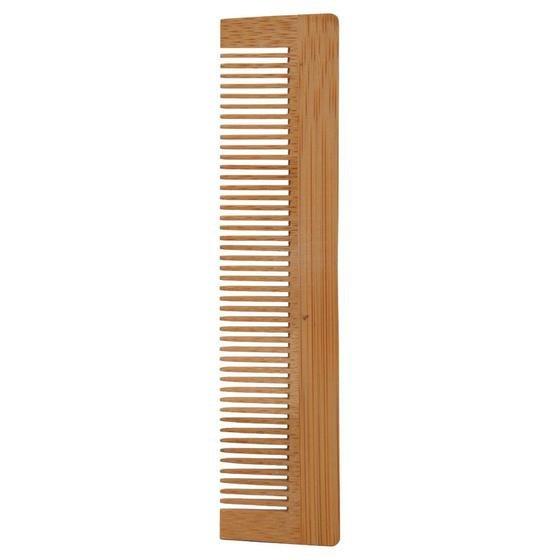BIO PLASTIC BIN LINER (COST: RS.110/-)
₹110.0
H x W : 13.5 X 2.5 CM.
Unisex pocket comb,
Made of bamboo wood., a green alternative to
the plastic comb,
Natural material used, so can be composted.
Eco-Friendly Bin Liner Rs.110:
Embracing eco-friendly products transforms waste into wealth, fostering sustainability and mitigating environmental impact. Innovative initiatives champion the conversion of discarded materials into valuable resources, paving the way for a circular economy.
To commence this virtuous cycle, recycling emerges as a key player. Plastics, paper, and metals, once destined for landfills, undergo a metamorphosis. These materials are reimagined, reincarnated into new products, reducing the demand for virgin resources and curbing pollution.
Biodegradable alternatives further revolutionize our consumption patterns. Products derived from natural materials seamlessly integrate into the ecosystem, leaving minimal traces. This shift not only reduces the burden on landfill sites but also curtails the persistence of harmful substances in the environment.
In the realm of waste-to-wealth, upcycling emerges as a creative force. Discarded items find a second life, elevated into functional and aesthetically pleasing artifacts. From repurposed furniture to fashionable accessories, upcycling not only minimizes waste but also showcases the beauty of sustainable design.
In the business landscape, companies increasingly adopt a cradle-to-cradle approach. This entails designing products with their end-of-life in mind, ensuring that materials can be easily disassembled and reused. Such practices not only enhance resource efficiency but also cultivate a mindset of responsibility within the industry.
Eco-Friendly Bin Liner Rs.110: The waste-to-wealth paradigm extends beyond tangible goods to energy production. Biomass, a byproduct of organic waste, becomes a valuable energy source through anaerobic digestion or incineration, contributing to the renewable energy matrix.
In conclusion, the transition to eco-friendly products and the waste-to-wealth philosophy signifies a revolutionary stride towards a sustainable future. By reimagining waste as a valuable resource, society not only mitigates environmental harm but also forges a path toward a regenerative and harmonious relationship with the planet.
You must be logged in to post a review.
Q & A
1. Materials Used
a. Bio-Based Materials: Bio plastic bin liners are often made from renewable resources such as cornstarch, sugarcane, or other plant-based materials. Unlike traditional plastics derived from fossil fuels, bio-based plastics reduce reliance on non-renewable resources and can have a lower environmental impact.
b. Biodegradable Components: Many bio plastics are designed to be biodegradable or compostable, meaning they break down into natural substances when exposed to biological processes. This helps mitigate the accumulation of waste in landfills and reduces long-term environmental impacts.
2. Production Processes
a. Reduced Greenhouse Gas Emissions: The production of bio-based plastics generally emits fewer greenhouse gases compared to conventional plastics. This is because the feedstocks used (such as crops) absorb CO₂ from the atmosphere during their growth, partially offsetting the emissions from their production and processing.
b. Energy Efficiency: Some bio plastic production processes are designed to be more energy-efficient than those used for conventional plastics. This can further reduce the overall carbon footprint associated with their manufacture.
3. End-of-Life Management
a. Compostability: Many bio plastic bin liners are compostable, meaning they can be broken down into organic matter in composting facilities. This process avoids landfill accumulation and contributes to nutrient recycling.
b. Reduced Pollution: Since bio plastics are designed to break down more easily, they contribute less to microplastic pollution, a significant environmental concern with traditional plastics.
Scientific References
Life Cycle Assessment (LCA) Studies: LCA studies have shown that bio plastics can have a lower environmental impact compared to traditional plastics. For instance, research published in Environmental Science & Technology has demonstrated that bio plastics made from cornstarch have a lower carbon footprint due to the renewable nature of the feedstock and lower emissions during production (e.g., Environmental Science & Technology, 2011).
Biodegradability Research: Studies on the biodegradability of bio plastics, such as those found in Journal of Polymers and the Environment, indicate that bio plastics decompose more effectively in composting conditions compared to conventional plastics (e.g., Journal of Polymers and the Environment, 2018).
Energy Consumption Analysis: Research published in Resources, Conservation & Recycling has highlighted the energy-efficient production methods of bio plastics, which contribute to their lower carbon footprint compared to traditional plastic production (e.g., Resources, Conservation & Recycling, 2016).
General Inquiries
There are no inquiries yet.

















Reviews
There are no reviews yet.